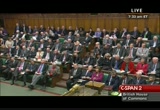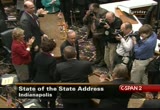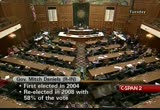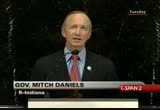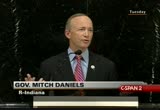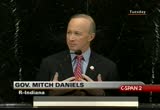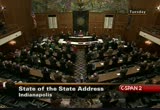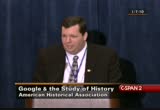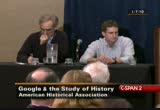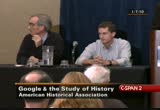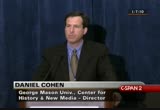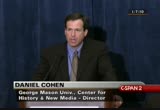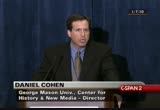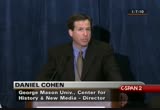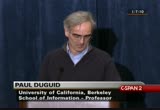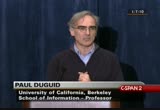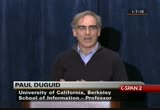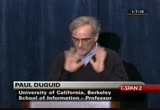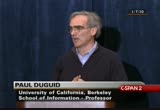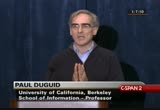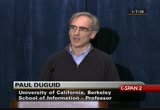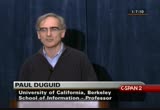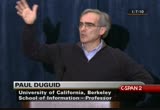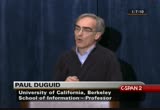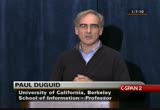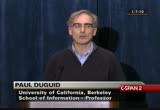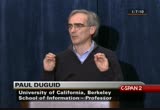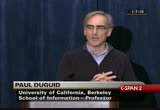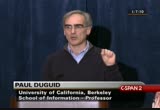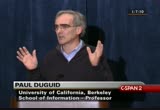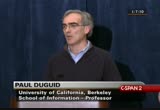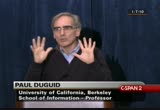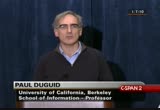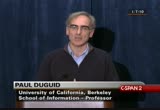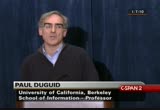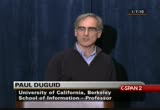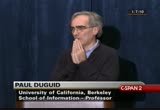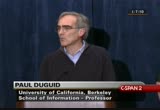tv Today in Washington CSPAN January 20, 2010 7:30am-9:00am EST
7:30 am
concentrate on policy. now that i've seen their policy, i've got to say they are just as well with her posters. [laughter] >> thank you, mr. speaker. can i ask the prime minister to look into the excessive delays within the home office for resolving the outstanding issues of funding for unaccompanied children's silence seekers in the london road with all the financial consequences and possible implications for social cohesion? >> i will undertake to look at this very matter. he's talking about an issue that is obviously very serious for those people who are affected by that and i will look at it very carefully. >> number seven, mr. speaker, on the alternative vote. >> i've given a commitment to referenda will be held early in the next part for the people to decide whether they want to move to the alternative vote system. >> while there is no such thing
7:31 am
as a perfect electoral system, the alternative vote would mean that every member of parliament returned would have at least 50 percent of the electorate local supporting the. it would also maintain and indeed strengthen the constituency link that is so vital for all members of parliament in this house. and like, what the prime minister therefore consider whether he put trust member of this house and ultimately members of the public to have a series discussion on a left world systems and consider what electoral system they should use to send people here are? >> mr. speaker, this was ultimately be decided i members of the public in a referendum. i think the advantage of the alternative vote system is that it retains the constituency link which i believe is important, not just a mbs of the house or butt to the whole population. but given the issues about trust and politics there is a case for
7:32 am
every member of this house coming here with the support of more than 50 percent of the electorate as a result of the alternative vote system to work. i believe there is a case for a referendum on this issue and i believe that those people who wish to see it reformed or wish to see a referendum on that basis. >> the 200 euro dam in my constituency which is an earthworks dam containing a chase water reservoir started to leak. a recent engineer's report says that if it collapses there will be scores of lives lost and a lasting effect on the west midlands as a region. the small district of lichfield hasn't gotten the funds to make the urgent repairs. can the prime minister please use his best endeavors to ensure that this is taken financially over a much broader region? >> of course, sir, i would be happy to look at what he says on
7:33 am
the very specific issue. but i do see he is making the case for public expenditure. >> mr. speaker, on friday in peace and counselors of all parties and local military historians will be gathering to take forward plans to provide a permanent memorial, and an active outstanding courage to what the prime minister though i have written to them on the subject and offer a message of support for our endeavors to mark for ever the gallantry of this truly local euro? >> i agree with him that a permanent memorial would be a great way of expressing, not only our debt to the people that he has mentioned, but are continuing debt to all those who have served our country and have been honored for doing so, would they have showed bravery and demonstrate the greatest of courage that i hope his proposal can move forward and we can do everything we can to be ablo
7:34 am
help. >> mr. speaker, will the prime minister introduced an annual limit on immigration? >> mr. speaker, what we've introduced as a point system and on immigration, i believe that points system is starting to work. and i believe he will see from the advancements of coming soon that the number of people that we need to come to the country to meet skills are needed in this country is being substantially reduced as a result of the skills that we are training and the people we are training in this country. so the points system is working in a way that those unskilled workers who are not needed to come to the country, therefore cannot make a competition to the economy are not allowed into the country. >> order. the statement, the prime minister.
7:35 am
7:36 am
7:37 am
[applause] mr. speaker, members of the assembly, fellow hoosiers, good evening. this once a year we gather as a family might, to take stock of our state's health and to assess the performance of our public duties. the sense of privilege one feels on this podium never diminishes, nor the sense of duty to report honestly and accurately on our family situation and the health of our public institutions. it's our way in the state to speak plainly, and to face reality squarely. the plain truth is that life is difficult tonight for far too many hoosiers. and economy booming at full employment at year and a half ago has taken several steps
7:38 am
back. one and 11 workers is unemployed, one in six people on medicaid. the average hoosier income fell last year, by almost 1%, we are distressed, disappointed, and dissatisfied at all this. i know we are united in this chamber in seeking to do what government can to work through an out of the national recession in which we are enmeshed. [applause] >> but hoosiers are also known for resilience, for avoiding self-pity, and for keeping a sense of perspective. we know that we have battled through tougher times before. we know that the possessions, the technology, even the shrunken incomes in our homes today, are still vastly greater than anything hoosiers nude just one generation ago. we know that our jobless rate,
7:39 am
though intolerable, is below the national average and well below that of neighboring states. we also know that this is not the only such meeting taking place this month. across america, 49 of the addresses are being given, almost all under conditions far more grim than those we confront. the one national study of able says that our budget problem is one of the smallest in the nation. our days most celebrated business sage says, you don't know who's been swimming naked until the tide goes out. [laughter] >> well, the tide is out, and now we know. compared to its budget, illinois fiscal problem is four times larger than ours. arizona's, five times. california's, six times. out there, the governor recently explained in desperation, how could we let something like that happen? so far at least, no one in this
7:40 am
room has to ask that question. a young seaman sought a better bareness advice, asking what do i do when i find myself in a gale force wind with a dangerous reef to leeward? to which the old sea captain replied, what you do is, you don't get yourself in that position. through the discipline of legislators on this floor, and as a verb, businesslike management of my colleagues and those about gimmies, indiana stands in a position very different from virtually all our sister states. they crashed on the read many months ago. they have seen their credit ratings downgraded and their borrowing costs for. indiana has a aaa credit rating for the first time ever, saving millions in interest costs for our cities, schools and universities. we will be using a carefully built reserves to get us through this next year and a half.
7:41 am
in the reserves most of the state had have long since disappeared. they have slashed, sometimes virtually halted, the construction and repair of state roads. in michigan, they are grinding asphalt roads back into gravel, as though to regress by a sentry. but here, we are building for indiana's future at a rate twice the previous all time record. all over indiana, the dreams of decades are becoming real. the hoosier heartland quarter, the fort to port highway, u.s. 31 from south bend, i 69, and hundreds of others, all at full speed, under budget,hedule, take our very eyes. [applause]
7:42 am
>> after growing education spending five years in a role, but a total of 12%, we were recently, reluctantly forced to trim it by some $0.03 on the dollar. but all across the country, education spending has been reduced by vastly more. by twice as much in places like washington, nebraska, connecticut. by three times as much in virginia, mississippi, and you don't. four times as much in minnesota and south carolina. six times as much in alabama. around our nation, states have closed parks, stiffed vendors, throwing people off medicaid, stopped blowing snow, and released thousands of dangerous criminals from prison early. overnight last night, the citizens of iowa were protected by seven state troopers, total. we have done none of those things and don't intend to. saddest of all, our sister states, at least 40 of them, are doing the worst thing possible in times like these.
7:43 am
they are raising taxes, adding to the burden on families already in distress, and making the economic climate is even less attractive to new jobs than they were before. michigan, wisconsin, new jersey and at least 11 more have raised income taxes. ohio, oregon, minnesota, and 30 more, have raised gas taxes. many states have raised multiple taxes at the same time. i hope you will join me in saying tonight to the people for whom we all work, we will make the hard choices, we will stretch the available dollars, we will do whatever is necessary but we will not take the easy way out and we will not make this recession worse by adding one sent to the tax burden of our fellow citizens. [applause] >> and for us economy and
7:44 am
government did not begin with this recession. together we brought the state from bankruptcy to solvency over a five year period of careful budget, stewardship, and before. per capita state government spending in indiana is now sixth lowest in the nation, and a place improvement from a few years ago. state government has two thirds fewer airplanes, thousands fewer vehicles. we had the fewest state employees since 1982. we have heeded the mariners instruction. what we did was, we didn't get ourselves in the position of other states. and yet, the gale of shrunken revenues is still blowing. the wreath of huge service cuts or higher taxes is still close to leave. solvency, like freedom, requires
7:45 am
eternal vigilance. we could be michigan in a minute of meekness, illinois and an instant of their resolution there the budget you passed to six months ago may have seemed reasonably frugal at the time, but almost immediately we could all tell that it's been beyond our declining means that if we had done nothing, it's spending levels would have a blue or red in our antistate reserve by six or seven months from now. so we have acted, and will act again as necessary. i think this is system and our fellow citizens for understanding the very unwelcome decisions we have made to date. we will need your continued understanding, for more hard calls that are probably coming. we will make those for which we already have the authority, but there are savings measures for which we need changes only this assembly can make. and so my first request is for legislation to enable the saving of some $70 million to a host of
7:46 am
new economies. the largest of these would permit us to manage our two pension funds, perf and trf, under one administration. absolutely nothing would change in the benefits, or the amount of funding, or in the totally separate, independent status of the systems. all that would change is the amount paid out in investment fees, when we did the job as one large bundle. if someone's wall street bonus is a little smaller next year while we sit indiana taxpayers 40 or $50 million, i think we can all live with that. [applause] >> we need to savings this bill would make possible cut. they are equivalent, for example, to 1 percent of our k-12 payments, or 5 percent of our higher education spending, or 10 percent of our combined law enforcement budgets.
7:47 am
far better to reduce nice to do expenditures in state government than to make even tougher they must do task of educating our young people and protecting the public safety. i make a second request in the name of some of them bravest and most deserving of all those hoosiers struggling this evening, the single parents of our state. there is no one more contemptible to me that a person who brings a child into this world and then failed to live up to the duties of parenthood. and for those who compound their absence by refusing their court-ordered duty to pay child support, i had even less respect. after five years of hard effort, we have raised the percentage of child support collected from about 50 percent to 58%. this of course is still unacceptably low. the best days are upwards of 70%. we need new tools to make further headway. for instance, allow us to see that a delinquent father who wins money in one of our casinos share some of the take with his
7:48 am
children. every% of child support improvement since the $7 million directly into the pockets of some of our neediest households. representative linda lawson and senator richard bray have joined to help us. please give your bipartisan support to the bray-lawson bill and let's provide millions of dollars to some of the homes which need them the very most. [applause] >> all of us tonight are rightly preoccupied with the recession and the problems it presents to our public services. but in times of these hardships will pass. what must not pass is an opportunity to continue indiana's steady progress in reforming our public institutions. in 2005, you approved our top to bottom overhaul of the ethics rules for the executive branch. we tightened the gift rules,
7:49 am
protected whistleblowers, stop the revolving door between government and lobbying, and stiffened penalties for any violations. we created an inspector general and a new battalion of fraud fighters to police this new era of higher standards. the dog that doesn't bark rarely gets noticed, but let's notice tonight, that armed with the tools you make possible, indiana has seen five years of scandal free government and we are determined to keep it that way. [applause] >> and so all hoosiers should welcome the excellent initiative of your leadership to bring similar reform to this, the senior branch of our government. mr. speaker, mr. pro tem, i
7:50 am
applaud your proposals to raise the standards to which legislators will now be helped it will enhance the quality of your decisions and the confidence of our citizens in those decisions. thank you for stepping forward so boldly. i look forward to signing this important new law. while you're at it, please respond to the plea of mayors of both parties and all parts of our state, and in the egregious conflicts of interest that occur when public employees sit on city and county councils, boating on their own salaries and overriding the decisions of their own management. how we ever permitted this to occur in indiana is one of those mysteries of history, but now is an ideal time to strike another blow for good government and end this abuse for ever. [applause]
7:51 am
>> in another area reform has been well begun, and is ready for a second chapter. from this platform a year ago, i thanked governor joe kernan, chief justice randy shepherd, and the commission colleagues for a superb set of proposals to modernize indiana's pioneer days system of local government. a state committed to protecting taxpayers, and limiting government to the role of the people surveyed, has no business maintaining more elected politicians and states twice our size. it's wasteful. is antiquated. it produces poor decisions, and it obscures the public's ability to assign either credit for success or blame for failure. this assembly has taken the first steps toward cleaning up is an anachronism. you have dealt with five of the commissioners seven recommendations, most noticeably the elimination of the township assessors. you reduce the number of cooked in the assessment kitchen by about 1000. having as many as 20 different
7:52 am
assessors setting property values in a single county was a formula for unfairness, waste and, although often, corruption. moving assessment to a single, accounting county official was a matter of simple common sense. the exact same principle applies to poor relief and fire protection, still handle as they were in 1848. i hope i have seen for the last time new half-million dollar firetrucks bought in fire station a couple blocks apart because two totally separate township boards were involved. just as you already get for libraries, we can maintain local distribution of poor relief, local identity and leadership of our fire departments, my moving resource and taxing decision to the county level where they can be made rationally and for the maximum benefit of all citizens. in the process, we can save millions and delete 3000 more political offices for which there is rarely any competition anyway. and we can put an end to the
7:53 am
widespread nepotism which, even when good people are involved, simply doesn't pass the test of good government. [applause] >> and as we reduce the number of politicians, let's reduce the number of elections we hold. the commission's suggestion to see shift municipal and school board elections to the fall of even numbered years would not only boost turnout for these important offices, it would save tens of millions of dollars for our hard-pressed local governments. this may be as we say, a short session, but we can still take a long stride towards modernization of our top heavy and expensive local government. in no area is reform more urgent, or more critical to indiana's future, then in education here and here, the news is excellent and the
7:54 am
momentum even stronger. 2009 was a breakthrough year in improving the way we prepare our young people for the lives and the work i had. first, this assembly heeded the call of president obama and others and listed indiana's backward looking lemmas on charter schools and on considering student achievement in evaluating teachers. then, a professional standards board led by our superb new superintendent, tony bennett, acted to strengthen standards for new teachers, and to open both classroom and leadership positions to those whose hearts called into teaching from other walks of life. next, we must address the single greatest cause of student failure, the inability of so many of our children to be proficiently. if the school accomplishes nothing else in a child's decisive first years, it simply must enable him or her to read and comprehend the english
7:55 am
language. yet too often that it is masked by the practice known as social promotion. sending an illiterate child onto higher grades is unfair to the next teacher, damaging to our state's future, but cruelest of all, disasters to the young life in blighted by that failure. if after four years the system has failed in this most fundamental duty, then it will simply have to try again until it gets it right. i ask you to pass our bill to stop social promotion, and to say to the world that indiana never gives up on its children, not one single kid. [applause]
7:56 am
>> to more actions can stamp 2010 as an historic moment for every government in our state. first, let's set the stage for the fairest, most reasonable and nonpartisan redistricting ever seen in indiana. too many times in american history, legislative boundaries have been drawn to favor halves over have-nots, and over outs, incumbents over newcomers. the worst example of gerrymandering and politician protection can be found in other states, but i glance at indiana's current lines shows that they are nothing to be proud of. we praise tonight that the bipartisan expression of intent that indiana's next redistricting be its fairest ever. members of both parties have offered constructive ideas for lines that make more geographic, demographic, and just plain common sense and today's. let's commit to the kind of principles that assured hoosiers that in our state, voters will pick their officeholders and not vice versa.
7:57 am
[applause] >> lastly, some heartfelt congratulations. just eight days into session, this assembly has already made history by completing and safeguarding some excellent work you began two years ago. in 2008, you passed the largest tax cut in state history, and reduced indiana's property taxes to some of the lowest in the nation. at a time when every penny counts, and home foreclosures are a national epidemic, you lower the cost annually of owning the average hoosier home by more than $500 that the american dream of homeownership is more affordable in indiana tonight than in virtually any other place in a country. but you did more. you provided hoosiers unique protection and certainty,
7:58 am
through cast that securities lower taxes from ever surging out of control again. as we all know, those caps will always be vulnerable in either legislative or judicial review unless protected by our constitution. those who favor more government, more spending, and higher property taxes have every right to present their arguments before the caps become permanent. but they must have the courage to make their case before the final arbiters of our constitution, all the people of our state, boating and referendum next fall. at 2:31 pm this afternoon, the people's branch of government lived up to its name. you give the people the chance to decide, as i believe they will, that lower property taxes are here to stay. thank you for this latest bold move to show the world that in indiana, we trust our fellow citizens and we truly put the interest of taxpayers first. [applause]
7:59 am
. . but not crisis, stress but not disaster is small consolation. no one here will breathe easy or sleep well until we return to the full employment indiana knew just a year and a half ago. but we must recognize that the way we do our duty today is about more than just muddling through the short-term better than the next guy. it's about lengthening our competitive edge. every time another state raises a tax, can't pay its bills on time or sends out ious instead of tax refunds, it slips another notch behind indiana as an attractive place for the next new job, the
8:00 am
next new dollar of investment. the better we handle the people's business today, the more business we will have for our people, and the more opportunity for our children, tomorrow. even in this hardest year in so long, signs of strength are everywhere. forced by the downturn to a choice between indiana and some other place, at least 50 companies closed up shop elsewhere and relocated jobs to our state. jobs came from michigan to marion, from pennsylvania to decatur, from wisconsin to auburn, from mexico to elkhart. there's that long german word i always there eat that long german word i always mispronounce, that means enjoyment obtained from the troubles of others. watching the agonies of other states, we take no delight at this
8:01 am
misfortune. hoosiers never do. our first reaction to a neighbor in trouble is to look for a way to help. but if we take no enjoyment, we will take the jobs from companies who know a state built for growth, a state with its act together, hen they see one. when the if we take no enjoyment we will take jobs from companies in a auate with its act together when the dust settles on this recession we will have a higher share of america's auto and steel jobs than we did before. in 2009 when national business investment fell the number of new jobs committed to indiana actually grew over the near record year of 2008. 2009 was the year when several young companies who may lead the
8:02 am
electric vehicle industry chose indiana for their plans. many of their suppliers are following. our goal is to be the capital of this massive industry. over the last two years indiana has been the fastest-growing state in wind power and business is seeking to build the equipment coming to new albany and clinton. within weeks you will see us explode on to the solar power landscape. perhaps most telling, 2008 brought the welcome word that moreeoe moving into indiana than moving out. the numbers were not huge but they mark a big reversal from an era in which most years sought exodus sometimes including many of our most promising young people. one recent identified indiana as the second place to place in america for college graduates. the college team that is in hot
8:03 am
water. we have stood up to this recession with the strength reflecting the 30 character users. odds are the year will not be easier. everyone in the public's employee has a chance to do so remembering where jobs come from and who it is that pays for our salaries and every penny we dispense. two years ago tonight i recall the toughest question i was asked in my first month as governor. what makes your state distinctive? what makes you stand out? no need to ask any more. but at any map of states still in the black. states preferred for new jobs. states adding to their infrastructure where taxes have gone down and not up. a single batch of color below lake michigan like a penny and a
8:04 am
parking lot is the common feature of all such maps. let's conduct ourselves so that the year from tonight america sees in its fullness what it now sees in part. there's a special place in our land where hard times are met with resolve. where government is the people's 7, not a privileged class. web bucks are not passed and decisions on not dumped and scarce dollars are allocated as adults do to first things first. by then, america will see the same place leading the nation out of its decline. the industry is rebounding and new business is blossoming. of place applying the highest standards of conduct and accountability in its public arena. especial place called indiana to which the bright enterprising young creative are gravitating. it is not enough to stay off the reef. it is our duty and our golden
8:05 am
8:06 am
>> this joint session is adjourned. >> next week president obama delivers his first state of the union address to congress laying out his future for the country and its plan to deal with issues like unemployment, health care in iraq and afghanistan. the state of the union address next wednesday, january 27th at 9:00 eastern on c-span. >> now our discussion on google books and the book did it is asian program. we will hear from the manager of google books and media and information professors from george mason university of california. this discussion from the annual
8:07 am
meeting of the american historical association in san diego is two hours. >> hello to everybody. thank you for coming. i am shawn martin from the university of pennsylvania and executive director of the history of computing and we are happy to be cosponsoring the session with the research association on is google good for history which is an engaging and interesting topic and i hope you already have questions in mind for discussion. we have a three great speakers who will be talking for 15 minutes each, may be a little bit more. they will talk in that order and we will have time for questions
8:08 am
at the end. without further ado i will introduce our three speakers. the first is daniel cohen, associate professor in the department of history at george mason university and director of new media. his research is european and intellectual history and the history of science and most notably for this group he is co-author of digital history, a guide for presenting the past on the web from the university of pennsylvania. no small connection i assure you. our second speaker is paul duquid, and adjunct professor at the university of california berkeley and professorial research fellow at queen mary university of london and visiting fellow and business management at york university and honorary fellow for the institute for entrepreneurship and enterprise management. his car and researchers on
8:09 am
history and development of trade marks and has written two articles about google and the issues google raises for history in particular. one inheritance or loss, a brief survey of google books and all so self organization, production and the laws of quality from first monday. last but not least is brandon badger, product manager for google books. he has been there for four years. he has worked on google earth and google's and studied computer science in college. he got a b minus on all his history classes. without further ado i will let the speakers go. >> thanks, great to be here and
8:10 am
to talk about this topic. is google good for history? of course it is. we historians are searchers of information evidence and google is the most powerful tool ever given to us or any other human being to do just that. it has constructed a deceptively powerful and simple way to scan billions of documents instantaneously. it has spent hundreds of millions of dollars of its own money to allow us to read millions of books in our pajamas. how about great? we historians, like other scholars, are natural born critics. we can find fault with nearly anything and we do. it is exacerbated when a large company consisting mostly of better paid graduates on the other side of campus muscles
8:11 am
into our turf. at google spent hundreds of millions of dollars on the library at harvard we would have complained about all those steps to the front entrance. partly out of fear and partly out of envy it is easy to take shots at google. an obsessive book about google comes out every week. where are the criticisms about other large information companies that serve the academic market in more troubling ways? these companies which also provide search and information services charge exorbitant rates for the privilege of access. money comes out of budgets that go to more productive uses. google gives us the google books, google scholar, scanned newspaper archives and mort and commercial offerings and often being completely free. in its bigger picture, obsession with the biggest tech company of
8:12 am
the moment, the same obsession against microsoft and ibm. one can only hope they continue to exert pressure on those who provide costly alternatives. like many others who feel a special bond with books and cultural heritage i wish to google books was a project not under control of a private entity. for years i have called for a public project as have many others or at least a university consortium to scan books on a scale that google is attempting. i am envious of the announcement in france to spend a billion dollars on public scanning. the center i work at, center for history and new media has a partnership with the internet archive to put content in a non profit environment that will maximize its utility and
8:13 am
distribution and make that content truly free in all senses of the word. i would rather see who will books at the internet archives by the library of congress or somewhere else but the likelihood of a publicly funded project in the age of tea party reaction is in is slim. longtime readers of my blog and other writing know that i have not pulled punches when it comes to google. the biggest spike in readership was when early in google books scanning project i casually put this can of a human hand covering a page of plato and the post was on dig and since then many examples detractors of google showed lack of quality in the library project. let's discuss these quality issues for a brief moment. an obsession is slightly misplaced. google has 4 scans.
8:14 am
haste makes waste but i have yet to see a scientific survey of the overall percentage of pages that are unreadable or missing and it is a miniscule infraction of the total. when dealing with a trillion pieces of data you are sure to get a million or two wrong. let's not forget the big geographic world is not perfect. many of the problems come from library partners and others outside google. google likely has remedies for many of these inadequacies. google is constantly improving its capability, often in clever ways. it recently purchased or acquired the system you may have heard of which uses an unwitting human to transcribe difficult or smudged words from old books when they log into sites and
8:15 am
they had feedback mechanisms for users to report on the page of their viewing. i find myself nonplussed by all the complaints about google books that have engineering solutions. that is what google does. it falls engineering problems extremely well. we should recognize that at its heart google books is at the outcome like so many other things of an engineering challenge and a series of mathematical problems. how can you scan tens of millions of books in a decade? it is easy to get all the details right but if you do those variables, getting a nearly perfect library scanning project will take 100 years rather than ten. that may be a fine trade-off but that is a different project. getting 99% accuracy to 99.9%
8:16 am
accuracy, we will take an order of magnitude longer and greater expense. that is the trade of google has decided to make. is unnecessary to concern the possibilities for reiterating towards perfection from an imperfect first version. it must be the decision for the company to make. google books is incredibly useful even with these flaws. trained in places with large research libraries, i am at an institution, people like google books is the savior enabling research that can only be done in the right places. students find new topics to research and new discoveries on google books. you can only imagine how
8:17 am
historical researchers and other scholars on a less privileged basis. despite its flaws google books will have a tremendous impact on historical scholarship around the globe in the coming decades. there is a tremendous level on way to -- google is also good for history in that challenges age-old assumptions about the way we have done history. before the dawn of massive digitization projects and equally important indices you had to pick and choose from the sea of analog documents. all that searching and sifting we did in particular documents and evidence we chose to write on were and are prone to errors. read it all in graduate school but whoever does? we sift through large archives based on intuition. we find important evidence out of sheer luck.
8:18 am
we make mountains out of molehills because we only have time to sift through molehills, not mountains. this world has really been the world of comprehensive historical search. this will only get worse. historical scholarship will be exposed. the existence of modern search technology. it should tell us the partial methods have hidden from us the potential of taking a more comprehensive view aided by retrieval mechanisms despite what detractors might say are more objective and through folios on a time limited job to an archive. in addition, it may open up new
8:19 am
avenues for exploring the past. i argue that mathematics was generally considered a devine language but over the nineteenth century it was secularized. part of my evidence came from mathematical treatises which became divine language in the nineteenth century but lost that language was the end of the century. doing my research i had to pick and choose. my evidence -- i could only read a certain number of these mathematical works. i am sure this sounds familiar. i chose to focus on a writings of high-profile mathematicians. the fastness of google books presents me and others the opportunity to do more comprehensive scans. for me at victoria mathematical writing for evidence of religious language. this holds true, new modes of research for all of us. google has provided us not only
8:20 am
with free research but the helpful direct challenge to our research methodology. is google good for history? of course it is. does that mean we cannot provide constructive criticism of google to make it the best that it can be especially for historians? of course not. i would like to focus on one serious issue that ripples through many parts of google books. for a company that is the champion of openness and google remains strangely closed when it comes to google books. google books seems to operate in ways that are different from other google properties where google aims to give it all away. i still cannot understand why google doesn't make it easier for historians who want to do technical analyses of historical books to download them on mass. if it wanted to google could make a portal tomorrow to allow
8:21 am
people to download public domain books. i have heard the excuses before. we spend millions to digitized this. rich -- we are not going to give away. they have spent hundreds of millions of dollars on android and other software projects like chrome browser and they are giving those away. google's hesitance with regard to its books project shows open this only goes so far. us suppose we should understand that. google is a company. it is not a public library. but that is not -- they cast around google books at its inception or today in dramatic op-eds touting the social benefit of google books. in short, complaining about the quality of google scans distracts us from the larger problem at google books. the real problem especially for those in visual means and others
8:22 am
is it is only open in the read a book in my pajamas way. to be sure you can download many public domain books, they make it difficult to download illustrated text through multiple public domain books which is what you need for more sophisticated historical research and beyond the public domain, google has pushed for a restrictive regime for millions of so-called orphan books. i would like to see a settlement that offers greater, not lesser access to these works in addition to greater availability for computational access to google books. a higher level of access, image on your computer, applying digital tools to many pages of books at one time to create new knowledge and understanding. this is partially promised to make the google books settlement in the form of research centers.
8:23 am
those centers will be behind and i suspect the casual historian which includes most of us will be unlikely to use these. google as elaborate strategies for application programming interfaces for most of its services and provides the most superficial access to google books. for a company that thrives on openness and empowerment of users google books is to me a bit of a puzzle. with much fanfare google has recently launched out of internal education what it calls a deliberation front to ensure portability of data and openness. on dataliberation.org which i encourage you to visit these list 25 google project on how to maximize their portability and openness. these are all of the main services at google. it is nowhere to be seen on this
8:24 am
site. includes user created data such as the library features not to mention all of the data we have paid for with our tax dollars and tuition. they put their revolutionary first on one side, on the other side, colleagues with a circumscribe group of authors and publishers, through a settlement that few in the academy support. others have done an admirable job explaining the internal processes at google books. is better than the engineers and product managers. the project was removed in a way that other projects are not. that is because they are less hamstrung from respondents. and instituting more liberal
8:25 am
policies and features. that will be the company that digitizes entire libraries. leading to a breakdown with authors and publishers in front of us today. we should remember the reason we are at a settlement now is google did not have enough of a spot to take the higher tougher road to courts, the court of public opinion or congress to the intellectual property issue that governs many books and brings them on line even though authors and publishers are long gone. google uses its power to alter market radically, it has been uncharacteristically weak in attacking head on the intellectual property tower and its powerful corporate defenders. at google taken a stronger stance historians would likely be fully behind their efforts. unbalanced copyright law on scholarly use of audio and video
8:26 am
evidence. i would rather have historians handle google together. google as a research tool challenges our historical methods, historians may have the ability to make better what google does. historical and humanistic questions are often the height of complexity among engineering challenges similar to and even beyond machine transmission. google's engineers might learn a great deal from our scholarly practice. it has been optimized over the last decade to search through the hyperlink documents but the same algorithms' falter when faced with the odd challenge of change over centuries. old books and documents that historians examine daily.
8:27 am
the talent in computer -- founders in many respects. they're working on these sources as opposed to say the highly structured scientific papers google scholars specializing in. studying how professional historians rank primary and secondary sources might tell google a lot which it could use in turn to help scholars. ultimately the interesting question for me is not is google good for history. it might be is history good for google and to both questions my answer is yes. [applause]
8:28 am
>> good afternoon. thank you to whoever it was that invited me here. i am very grateful to be invited. i am slightly apprehensive. i am not a historian. talking to you about these questions is tricky. i am not an engineer. i have to share the platform on either side. i have an embarrassing confession that i teach a course called the history of information which in 15 weeks goes to twitter. the claims are not very strong. since the last semester, what you do not like about this course called the history of information and the one word is history. i have not done a very good job representing you to other parts of the world. in looking at the broad question, the same steps, is google good for history to talk
8:29 am
about google books. the shift in the way i think of scan, scan, scan. that was the premise of the panel. i sounded off on the topic. i have been up since splendidly vilified by historians for doing so. let me see if i can get further. my answer is the same. is google books good for history? absolutely. my question is is it good enough? the answer is no. similar to dan, i look at different points that you wants to dismiss and say not important. let me outline three issues, what i think is wrong at the moment. why it went wrong and will be harder to fix than we might imagine and finally, why it seems to me surprisingly hard to
8:30 am
criticize google. then seems to think google is an easy target. i tend to think they are the other side that people think too highly at new land is worth taking shots at it. did the there's a lot deserves . i think probably -- librarians in general are remarkably supine with regard to google. they have failed to do so. in a way that a story i haven't found a punch line for, the irishman and scott and went into
8:31 am
the bar. and engineer and librarian and scholar embark on this project. what is the punch line? i am still trying to see. let me assess what i think is wrong. i will explain a little later, working in silicon valley, it is a constraint issue. what i want to say is we look at books as these paper bound collections of information and if we could come and extract the information and leave the paper behind that will make life a lot easier. in many ways it does. it overlooks the fact that books are actually enormously complex and annoying things. they are that way because they embody physically a resolution to a lot of very complex questions about human communication. they may not do it perfectly and often get in the way but a lot
8:32 am
of the difficulty we have in communicating is resolved in the physicality of the book. when you take that away you have to think a lot about what you are using as well as what you are gaining. my argument would be one reason google is fraught with problems is because -- it is bad. it is a very large problem because my feeling is when you take away the almost invisible resources in the way the book was built you have to provide better data to help resolve the remaining information you have. information doesn't speak for itself and its own validity. if you write a check to somebody and they look quizzically at it and say should i trust it or not it doesn't actually help to lean forward and right good for payment on the front of the check. that isn't going to get someone
8:33 am
-- it is a little more information. my general theory is you have in some ways to think a lot about the ways in which you triangulate, wait it has been trying belated in the past and google has made a hash of that and didn't understand the problems. i use google and google books extensively. just finished a piece on the contribution of the union label in the united states. google books was in many ways the way -- what we have not known existed. i e rely on it enormously but at the same time using something like infuriatingly though it is, i was using 18th-century books online. many of you have read a wonderful piece of the
8:34 am
inadequacy of that. the difference is quite extraordinary. the point is not to say i agree with that, wouldn't it be wonderful if they had managed to do that to the extent that google did. if google managed in some way to arrange method data, that is what i would like to bring together. i will point you all to the chronicle of higher education about google as a method data train wreck. he pulls out series after series of things that google got wrong. he got villified for that. the people who think him for it, dan clancy in google, thanks for pointing to the fact that they
8:35 am
had all of these. they took it seriously. one of the things that went wrong was miss identification by title. miss identification by author with madam boveri and this identification with thomas brown under gardening and masses of ms. identification by states so i was delighted to find i had written a book published in 1879. you may wonder how i remain looking so young. that is critical for historians. what do historians have going for them? you haven't got a lot left. is it surprising that they went down this road? talking to me in 2004 but we are going to scan books.
8:36 am
we will scan every one of them. that is not a very good way to begin. talking to people at google and a lot of people work on google, we don't say it publicly. the other thing i discovered was confirmed by google. the six libraries working with google, they asked for the books and offered method data. google said we don't need that. that is libraries of. we can do it with algorithms. they came back later and said a lot of that stuff, you wouldn't mind if we had a little of that and took it away. to do away with massive data you
8:37 am
need good algorithms. google didn't understand the problem. that is what -- if you push that, we don't really understand that, why didn't you talk to scholars? the reason librarians are proxy, that wasn't very helpful. what is the issue? this is it. what we have gotten out of google books is a wonderful fascinating brilliant irreplaceable marvelous fantastic, can i say it again and again, bunch of books. it is a huge difference because if we are going to invest in the library of a future, that is what we want. we don't simply want the old library with breath running over it. we want something more
8:38 am
adventurous than that and we haven't gotten that yet. my way of thinking about what went wrong was to quote from george bush, it is a case of missunderestimation. they didn't understand the problem. the evidence of that other than describing the project before it got under way, when my colleague was deciding some of the ryan may lead data in google a library and stood up, don't worry about the broken made adata you confined that in another way. sort of critical, google saved me a lot of trips to the library. if that is really what we have
8:39 am
invested huge resources, not just google, and we're just saving trips to the library, that is pretty sad. as others have argued, this is probably a once in for all -- could dan clancy to the wall and he will admit nobody is ever likely to take this task on again. google has squeezed that space out. also star of the lot of -- i talked to major centers with a huge amount of money, give up that scanning. google is doing it. people with particular domain expertise are being told to
8:40 am
stop. they will serve these -- sylvie's at a lower price. using the data they have built. thatsell these at a lower price. using the data they have built. that is a worrying concept. they might give up with a half finished project badly executed. if you look at some of the people at google there is a look of fear about how much it has cost. if you ask how much it cost they will tell you. it frightens them. i have talked to several people. if i am right about what is wrong why did it go wrong? one of the things is a splendid the naive romantic.
8:41 am
it was a lot easier -- books look deceptively easy. can you pull those hard-headed engine years splendidly night eve romantics? it is a little unfair but one reason they often start off in one direction, currently the predominant business model for commercial search engines is advertising. the goal of the advertising business model not correspond to quality. we expect -- search engine bias is particularly insidious. the outline for the google search. or a letter talking about this. people don't buy books anymore you should put your books online for free. the letter asked him who would
8:42 am
pay the salary to work on the books or my trips to google including air fare, who would edit the books, who would prepare the index? by the end of my questions he wanted to change the subject. the reason is he has in some faith in the internet and inadequate knowledge about how books are published. these people are -- when you hear them talk about books you shatter a little. in an article on how we were collectively the constant in new york about google library, what was his validation? in 1916 he found a reference to an electric car. the idea that what we have got is a serendipitous dipping tool.
8:43 am
my experience is there's a deep conviction to provide resources and strength. what a good engineering solution does is move the constraints and you are left with the results. the world doesn't provide easily that way. paper and books is one example in which it doesn't. when we start to see the issues that come about, in 1909 the first example of someone saying within a couple years we will have newspapers without paper and we are still -- we still haven't gotten -- nobody knows what the business model will be and people in google new. people are perplexed about what the future is. the idea that you can remove constraints and end up with resources is deep. that goes along with two
8:44 am
powerful but problematic engineering traits. that is the proof of concept. with the tools that i have got, i will show you how this will work. at that point a lot of the best engineers tend to walk away. that is why things remain the turtle the bleak. the hard, tedious work of how to get the proof of concept giving serious execution to hang around for a long while. let me give one brief example. he asked scientific proof and i don't have scientific proof. it is all anecdotal. they put up on the google blog their latest new idea where they said we took this out of books and put them on the cover. doesn't that look pretty for those illustrated nineteenth
8:45 am
century books? and there were four examples of books they have done this with. the first was a book called for and butterflies, the second was about balloons in france and the third was studies in american countries. all were misidentified. the first had probably the wrong title and probably missed all the serious information that went along with it. the second one, that was, although it was a book on butterflies in the nineteenth century was classified as juvenile nonfiction. the one about ballooning in france was specified as juvenile nonfiction and studies of american -- i then looked inside the book because it was not only worth looking to see where they got information from the title page, if they are boasting about the illustrations, have a look it the illustrations.
8:46 am
the first illustration is a fold of illustration. all you get is massive folding. then i discovered what the real skill behind the algorithm was of going to the book and finding the illustration google had bought. i pointed this out, a list i shared with several people. they immediately went and changed the name and author of a book and got it even worse. my idea was they didn't know what was wrong in the first place and they boasted about how skillful they were. they wanted to say look what a good job we can do. they rushed to fix it and didn't know when they were doing when they fixed it. so it was even worse than before. what was intriguing, the first
8:47 am
person said why are you looking inside this book? as if that was an outrageous behavior and the second one was somebody said this is just an engineer. the first point is nobody says about someone at google than they are just an engineer, as if someone is just as a member of the institute of advanced studies. it doesn't work that way. if google has a lot -- the latest one which i love, it is dealing with multi volume works, and index in the back of a book, you can make hyperlinks to find it quicker. it happens to be a four volume work because it will only take you to the page within the book that the index appears in. it is meaningless.
8:48 am
samuel johnson isn't mentioned in the q to z section of the book. they need to understand the little more. one of the issues for me is the question of that concerns me a lot. we put enormous pressure on the question of quality in google books. how do you judge quality? one of the ways in which people just quality is have faith in the old books. this is what got me into this problem in the first place. project gutenberg, we will load these books off of the net. nineteenth century and late nineteenth century, the home of some of the most patrician publishing that ever happened. those books have been put out of the reach of the most innocent reader is.
8:49 am
if you want to look different editions you can find them but not the first copy that you put your hands on. most libraries, threw a winnowing system, moved into different things so you drive down across the state to find those books. the process was enormously powerful. good editing and better fellowship, we ended up in the position where the books on the shelf one way or the other we read as quality. they have gone in and sucked out of those repositories, they didn't go to the shelves where we have access to. down the road, star down with all the junk we have got. it was the very worst fishing.
8:50 am
i have been making the point for four years and each time we look it is even worse. the first dozen books are incomprehensible to anybody who understood anything about that book apart from you land in volume 3 of one edition and volume 2100 years later etc. etc.. it what we did with great step forward is pushing those back into the past. partly because of the effect of copyright laws but also -- that is where the library is. google should think nothing about it. i have gone on far too long but a couple points on why it is difficult to criticize. it is absolutely wonderful. i hate to be without it. one of the worrying things about the department of justice guidelines is it wants to push
8:51 am
back the specific view for a lot of us. the thought that all books will go back to that is does times. i don't support the settlement but that is one reason we should think about it. i have this problem of criticizing all these people, how do you criticize? it is like a high-school bake sale. that surely isn't the issue. i don't think we should pass it up. there's a lot of money and a lot of library resources that have gone into this and an awful lot in the opportunity costs that have been found out that i will never open again. free isn't good enough for me. one of the things that makes it difficult is a remarkable chameleons character. when they call it a library, in the new york times article, they
8:52 am
called it a library and when you say this doesn't look like a library, it is a library. they have to say what they are. are they a research tool or for the general reader? if it is a research tool it is for the general reader, you can't hold it -- if you say it is for the general reader you get strange things like a have all you i and can't find volume ii and the librarian says people don't read that way. going from volume i to volume ii is not a bad thing to do. the other thing people are a few with is going to get better. maybe, maybe not. and they know i am very critical and are talked to some of them and it hasn't gotten any better, has gotten worse. the other thing is we can't simply allow that technologically determined future, it will get better, we have to shout what is wrong with
8:53 am
it and why libraries are cooperating in this. they want to give the public life -- the other thing is if you criticize things like this you start to look like a luddite. that is one of the most difficult things in dealing with librarians. 200,000 arabs in the capital, he was flanked by google. librarians will start the war. one of the thing they did that was most -- libraries do things -- you will find senior librarian's standing up there. we make a terrible mess of data. we are awful. they don't lift 200,000 books at a stroke of a keyboard. that is not even in the capability. they don't have systematic problems. they have random problems.
8:54 am
if you say google gets volumes, it is wrong. we get volumes, that is wrong. the two problems are different. library is don't get four volume books published at the same time, they get multi volumes published over 70 years and who can blame them? that is not the same problem. you talk to senior librarians ranting about google, they spent time redeeming google by trashing their staff. all the people we employ are incompetent so why should we worry about google? that is a deeply disturbing thing. even more disturbing in some ways because when we say google -- i have a solution now. we are coming up with the happy truck. organized by libraries, it will redeem all of the errors that google made and all the failures the library had in the first
8:55 am
place. what you read about the happy trust is no worry, pain-free solutions, you can rely on the expertise of librarians. on the one hand they want to trust their staff who they say is incompetent and incapable and let google do it. we are so brilliant we will save the day. you can't have it both ways. are they incompetent or brilliant or somewhere in the middle? finally i have gone on too long, my apologies. not all but some, a scholarly small mindedness, biographical -- i have been accused more than once -- my dear old mother is long dead. completely careless son would
8:56 am
have made her life worthwhile. sorry it is too late. volume ii follows volume i or you should be able to find that madam boveri was written by henry james. god help us all. you just don't get it. you don't use it but you are not in the past or introducing new wants as i was accused of or you are feeding and pandering, none of that holds up. google books is great and good for history but equally if historians don't put pressure not necessarily on google but there libraries to think more seriously about what the collection of the future should look like and turning them not simply into a bunch of digitized books but a reliable -- we are wasting our time. thanks very much. [applause]
8:57 am
>> those were both good talks. my name is brandon badger and i am here for a selfish reason. you are power users. one of the things we do is listen to our users. larry and sir gay are encouraging us to build for the power users. if you do that well the product will work really well. when i worked on google turf and google maps, you can spin the globe and spy on your neighbors and see what they are building in the backyard. and meeting with people, geologists', try to soak up all of their learning so we can improve google maps and we have lots of problems. how to drive from new york to london, swim across the atlantic ocean. we actually put that in.
8:58 am
it tells you to drive off of the bridge. there are lots of errors and we are working to improve that. part of that is improving the sources of our data. part is improving your algorithm. we have these data points, where the roads are and how big the roads are and how to take the shortest path. you can improve that. we worked a lot to help the users fixing. if you type in your address to your home and it is on the wrong site you can go to google's and correct it. there is a lot of analogy for how we can help fix these things. what helps us also is why is google doing this? why isn't microsoft doing this? we are a corporation and we have shareholders. it is not a charity. why are we doing this?
8:59 am
it helps to understand the cultural little bit. they are very unique. that is what makes it an exciting and fun place to work. you have seen the videos about free meals and all that. it really is an engineering driven company. i work that places where they are doing their marketing research, this really is a unique company. it is very bottom up driven. the products come from the engineers. one engineers decided we could build a better e-mail system and management said that is a stupid idea. there are hundreds of e-mails out there but he felt passion about it and was given the freedom to work on it. projects like google books are the same way. someone is passionate about it. you are given freedom and resources to be
238 Views
IN COLLECTIONS
CSPAN2 Television Archive
Television Archive  Television Archive News Search Service
Television Archive News Search Service 
Uploaded by TV Archive on

 Live Music Archive
Live Music Archive Librivox Free Audio
Librivox Free Audio Metropolitan Museum
Metropolitan Museum Cleveland Museum of Art
Cleveland Museum of Art Internet Arcade
Internet Arcade Console Living Room
Console Living Room Books to Borrow
Books to Borrow Open Library
Open Library TV News
TV News Understanding 9/11
Understanding 9/11


